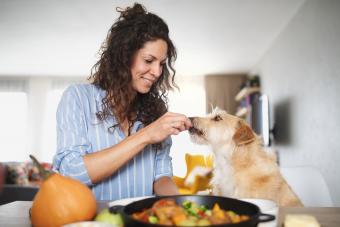
Not to be confused with sweet potatoes, yams are a common ingredient in holiday dishes. If you're deciding whether to offer your pet a bite from your plate, it's important to know if dogs can eat yams. The answer is yes; yams are safe for dogs when proper precautions are taken. Discover how to safely share this root vegetable with your dog.

Yams are a Safe Treat for Your Dog
Yams are a rich source of essential nutrients like fiber, potassium, copper, and vitamins A and C. These vitamins and minerals can promote healthy digestion and aid in preventing heart disease, among other advantages.
Despite their health benefits, yams are a starchy vegetable, meaning they are high in carbohydrates. Dogs require carbs as part of a healthy, balanced diet, but these should not be fed in excess. Pets who regularly eat too many carbohydrates can become overweight, which puts them at risk of developing many diseases.
The means of preparation is important when it comes to this vegetable. Yams must be cooked and peeled before feeding. Also, consider the ingredients used in preparation. Sweet yam dishes like candied yams are not safe for dogs due to their high sugar content.
Yams Vs. Sweet Potatoes
Although many folks use these two names interchangeably, yams and sweet potatoes are not the same. The flesh of yams tends to be starchier than that of sweet potatoes, and the skin is far rougher and tree bark-like. Both root vegetables have a unique taste and offer diverse nutritional benefits. The good news for pet owners is that yams and sweet potatoes are both safe for dogs to eat in moderation.

How Many Yams Can Your Dog Eat?
When feeding your dog any kind of treat, keep the 90/10 rule in mind: 90 percent of their diet should consist of a canine-formulated diet, while the remaining 10 percent can be made up of extras like treats. Yams are high in carbohydrates and calories at 177 calories per cup.
Limit the quantity of yams you feed your dog to no more than a tablespoon or two. Consuming too many yams can lead to gastrointestinal upset like vomiting or diarrhea.
Concerns Surrounding Diets High in Yams
Another reason experts advise dog owners not to feed high volumes of yams is because of its possible relationship with heart disease. Recent case studies report that long-term feeding of grain-free or limited ingredient diets can cause dilated cardiomyopathy (DCM) in dogs. Many of the diets involved in this data contained potatoes or legumes as the main ingredient.
Although it's unlikely that an occasional bite of yams or potatoes will lead to a heart condition, veterinarians suggest that owners avoid feeding a diet high in yams. This is of particular concern if you make your pet's food yourself or feed them a grain-free diet.
How to Prepare Yams for Your Dog
When making yams for your dog, there are various ways you can prepare them. Take these precautions to ensure that this vegetable is safe for your pup.

- Wash and peel yams.
- Cut into bite-sized pieces to prevent choking.
- Skip any oil, butter, salt, sugar, or seasonings, as these can be harmful to dogs.
- Boil, bake, or steam yams until cooked thoroughly.
- Allow to cool completely.
- Serve your dog a small amount as a treat or incorporate it into their food.
- As a summer treat, you can also mash cooked yams onto a tactile feeding mat and freeze.
Avoid Raw Yams
Yams must always be peeled and cooked to avoid harmful consequences. Raw yams contain toxins that can be dangerous if consumed by a dog. Cooking the yams, however, removes these components. If your dog eats raw yams, contact your veterinarian or an animal poison service right away.
Yam Dishes to Avoid
Although cooked yams are safe for dogs, certain yam dishes can contain toxic ingredients. Avoid yams served in these methods.
- Canned yams in syrup
- Candied yams or yam dishes with added sugar
- Yam dishes containing xylitol (often advertised as being "sugar-free")
- Yam dishes with nutmeg
- Yam dishes containing onion or garlic
- Yam dishes with added salt or seasonings
- Yams cooked with butter or oil
- Fried yams
Can Dogs Eat Yams?
Although yams can be beneficial for dogs in moderation, you should avoid serving many dishes containing this root vegetable. Instead, prepare yams yourself with limited ingredients or find a dog-specific product containing yams.







